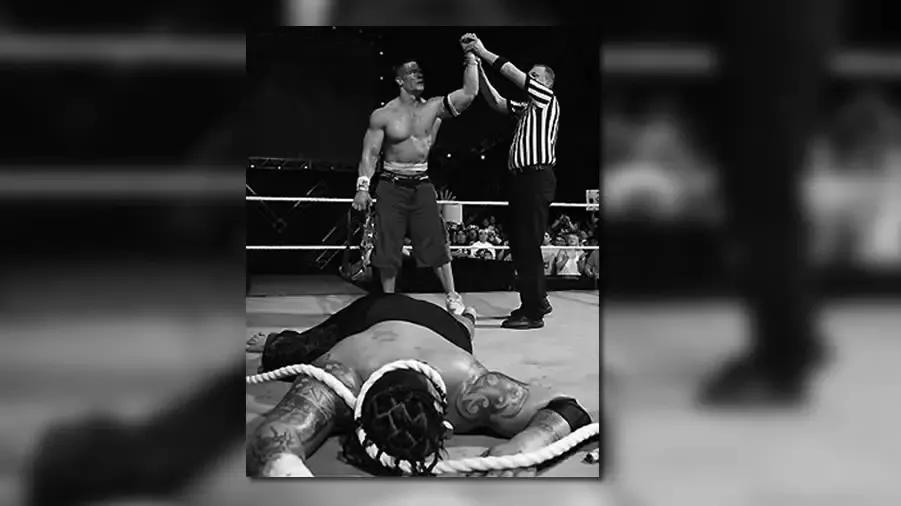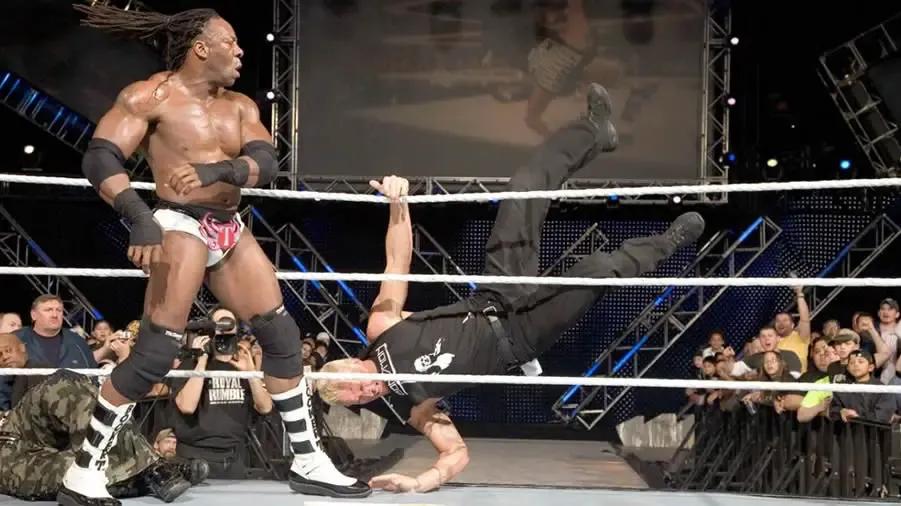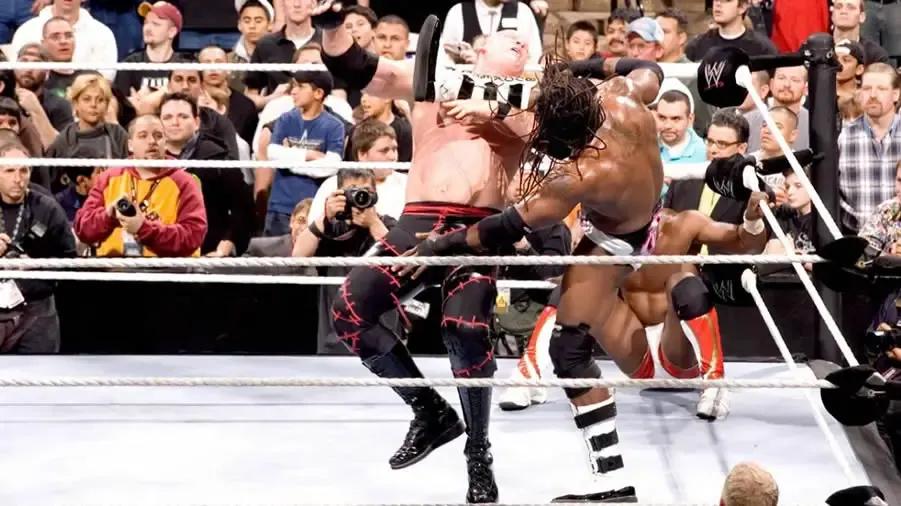10 Things We Learned From WWE Royal Rumble 2007
The one where The Undertaker won from number 30...

Jan 21, 2019
Now this is what I'm talking about - a night of just straight-forward good wrestling (mostly), a complete lack of BS and screwiness (mostly), and a big event feel that was enhanced by the final two matches being as excellent as they were. The 2007 Royal Rumble set a great tone for the calendar year ahead, and would be followed by epic shows like WrestleMania 23 and Backlash, before the balloon soundly burst that June.
After a pair of quality undercard matches in The Hardy Boyz vs. MNM and Batista vs. Mr. Kennedy for the World Heavyweight title, the stage was set for perhaps the greatest last man standing match of all time. WWE Champion John Cena warred hellaciously with Umaga, a man-vs-monster fight to the bitter end in what might be the best representation of "SuperCena". Even the fans deriding him earlier on were awestruck by the carnage and storytelling, and it's well worth seeking out.
That melee was followed by a damn good Rumble match, complete with a dramatic final sequence pitting Undertaker and Shawn Michaels, two native Texans, against one another. When it was all over, you knew you had just watched something very special, the hallmark of a pay-per-view that hit its target.

The card was very simple and straight-forward: an opening tag match to set the tone, three singles matches for each brand's top belt, and the Rumble match itself. In a somewhat unusual departure from previous years, each defending champion was a babyface, as opposed to heels seeking by-hook-or-crook victories en route to losing the belt come WrestleMania Sunday. And rather than drop their belts to a nefarious villain, each champ retained.
The 2007 Royal Rumble was the first Rumble in which babyfaces won every match, which added to the sense of enjoyability (screwjobs can diminish enjoyment unless done well). The 1990 show came close to having an all-face night of victories, marred only by a double-DQ in the Brutus Beefcake/Genius match. Thus, that's the only other Rumble to this point where no heels won.

The one real lowlight of the night was a low-energy ECW Title bout pitting Bobby Lashley (eight weeks after his coronation at the Academy Award-winning December to Dismember) against Test, whose physique in 2007 looked like he'd been sucking on an air hose down at the corner gas station. The match was a sluggish dance between mismatched partners, ending mercifully after seven minutes when Test took a countout loss.
Somewhat oddly, this was actually the pair's second match out of three against each other in a span of seven days. Lashley had already beaten Test on ECW's Tuesday night show the prior week, and again two nights after the Rumble, both via the Powerslam. So the pay-per-view match ends in a countout, while the TV matches have decisive finishes? Okie doke.

The injury bug took a sizable bite out of WWE at the dawn of 2007, when Triple H was badly hurt at the New Year's Revolution pay-per-view. While performing a Spinebuster, Helmsley tore his quadriceps, the second injury of that sort he would suffer that decade. Ultimately, "The Game" would miss more than seven months of action.
Prior to the injury, not only was Helmsley supposed to take part in the 2007 Rumble match, but he was also likely to be the eventual victor. Plans were for Triple H to face Cena in a rematch at WrestleMania 23 (some sources had Michaels in there for a triple threat match), while Undertaker's path to Batista would've been decided at a later date, perhaps No Way Out.

In 2003, five future World Champions under the WWE banner each competed in their first Rumble match: Batista, John Cena, Rey Mysterio, Eddie Guerrero, and Brock Lesnar. Four years later, another trio of future World Champions would at last wet their feet in the Rumble pool, with varying degrees of success in their first times out.
One was CM Punk, the cult favourite from the ECW brand who ended up posting the third-longest time in the match, at 27:16. Another was The Great Khali, whose World Heavyweight title reign is sometimes forgotten. Khali entered the fray at number 28 and cleared seven guys out of the ring in a short amount of time. Coming in one spot after him was The Miz, who lasted just seven seconds before Khali flung him out of the skirmish.

In previous Rumbles during the brand split era, Raw and SmackDown would each be represented by exactly 15 wrestlers, giving forth the idea that the two shows were on equal ground. When ECW came into the picture, the kid brother of the three shows was presented as a "less-than", but would still have representation in the Rumble match. But how much?
It would be SmackDown that suffered the most, as the 30 wrestlers boiled down to 13 for Raw, 10 for SmackDown, and seven for the tribe of sugar-free Extreme. It made sense, since ECW was riveted to SmackDown for both TV tapings and house shows, and SmackDown, despite the illusion offered on TV, was really the B-show to Raw's marquee status. Beginning with the 2007 Rumble, that depth chart was spelled out a bit more.

While Raw may have had the numbers game on their side, that wasn't exactly reflected in the overall match presentation. While they did outnumber SmackDown by three whole wrestlers, the members of their roster didn't have the best showing in the 2007 Rumble match. Most of the Raw field didn't get to spend a whole lot of time in the match.
Out of the 13 Raw wrestlers, only four of them lasted longer than seven minutes: Edge (the iron man at 44:02), Randy Orton (27:15), Shawn Michaels (24:11), and Shelton Benjamin (22:22). The remaining nine Raw wrestlers were among the 13 lowest times. There were nine SmackDown wrestlers out of the ten (Miz being the lone exception) that lasted longer than Viscera, who posted Raw's fifth best time of 6:22. So if you love the blue brand, puff out your chest for this one.

Kane was among that SmackDown squadron that outpaced Raw's gang of one-pump chumps, lasting a hearty 13 minutes and 21 seconds, scoring three eliminations. It may not have been his seminal performance in the 2001 match, but it sure beats much of the competition. And with his appearance in this match, Kane also made further history.
Counting his appearances in the 1996 and 1997 Rumbles (as Isaac Yankem and fake Diesel, respectively), this marked Kane's 11th Rumble match, putting him first all-time with most Rumble match appearances. A year earlier, Kane tied Fatu/Sultan/Rikishi, who appeared in 10 Rumbles between 1993 and 2004. Kane remains number one to this day, having wrestled in 19 Royal Rumbles as of his 2016 performance, his most recent.

There's nothing like a good "team elimination" spot, where some behemoth wrestler gets ganged up on by a horde of wrestlers, enemies working together to toss the mass of humanity over the ropes. It's always a guaranteed pop, and should really be a Rumble staple. Viscera understands this spot quite well, having set a record with it on two occasions.
In 1994, it took seven wrestlers to eliminate Viscera (then Mabel) from the Rumble, a then-record. Thirteen years later, it took eight wrestlers to toss Viscera from the match. Incredibly, Shawn Michaels and Bob Holly played a role in both eliminations, though in the 2007 match, Michaels merely Superkicked Viscera to soften him up for eight other wrestlers (Holly included) to muscle over.

Speaking of Michaels, he would make it to the end of the fray once more, single-handedly causing the eliminations of both Rated-RKO members, bringing the field down to just he and Undertaker. That epic ending sequence went a long way in making the Rumble match feel extra special, and although Michaels fell just short of victory, he joined a very small club with his performance.
Michaels became just the third Rumble participant in history to make the final four on four occasions. His previous times were in 1994, as well as his victories in 1995 and 1996. The only other wrestlers that managed to do this by 2007 were Steve Austin (five times between 1997 and 2002) and Kane (four times between 1997 and 2003).

Undertaker had drawn number 30 on two prior occasions - 1997 and 2003, and would fall short both times. On this night, he would ride the final number to victory, outlasting Shawn Michaels after an eight-minute sequence in which they were the final two men remaining. Undertaker winning a Royal Rumble was long overdue, as were the circumstances.
It took until the 20th Royal Rumble match, and at long last, number 30 won the bout. The purported best possible number was finally justified with Undertaker's victory, and only two 30's have won since: John Cena (the following year) and Triple H (2016). It's weird that prior to 2003, 28, 29, and 30 (you know, the three best numbers) had never won the match, but by 2007, each of them would (29 in 2003, 28 in 2005).